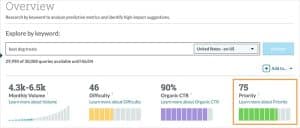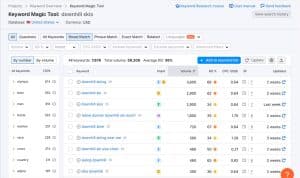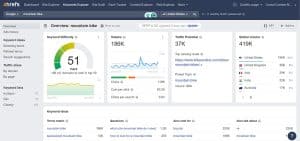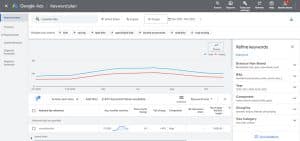Tech
5 Most advanced keyword research tools to be used in 2024
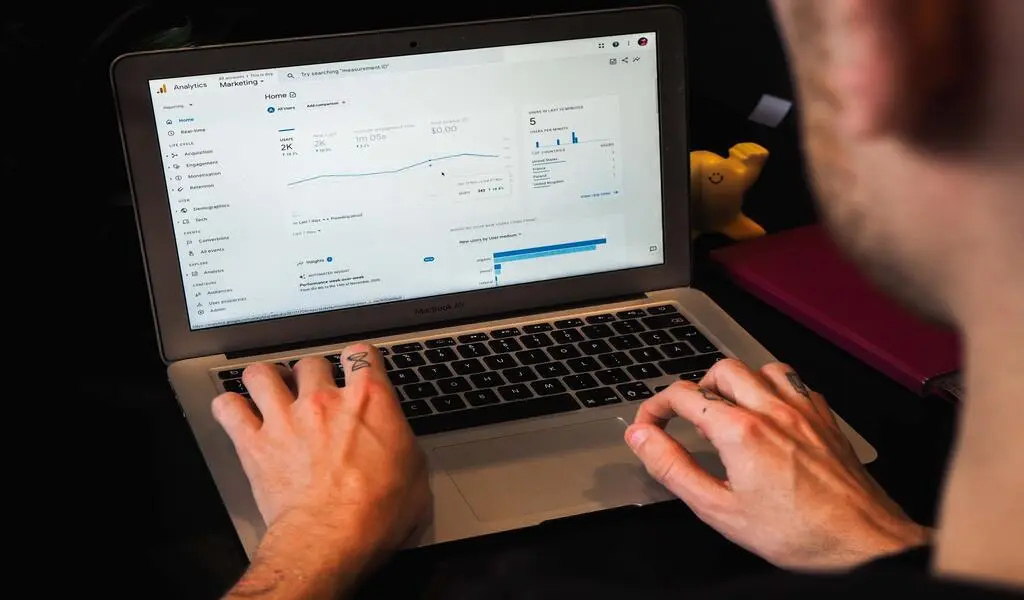
Probably 12 different answers if you ask a dozen digital marketers what keyword research tools they use. If you’re familiar with these platforms, you’ll understand why such a wide range of opinions exist. Every keyword tool has its features and varies in how deep the data is.
For your SEO strategy to work, you need a reliable keyword researcher to help you determine what your customers are searching for. Despite the many options on the market, how do you pick one that meets your business’s needs and budget?
Here are 5 keyword research tools to help you climb the SERPs and stay in the search engine spotlight.
Short List of Keyword Research Tools
We compared keyword tools based on ease of use and metrics. We’ll then discuss each platform’s pros, cons, and intricacies to ensure it’s right for you.
-
Moz: Best overall
-
Semrush: Best for user intent analysis
-
Ahrefs: Best for keyword tracking and analysis
-
QuestionDB: Best for long-tail keywords
-
Google Keyword Planner: Best for paid advertising keywords
The Science Behind Keyword Research
Because each tool collects and processes data differently, metrics like search volume, difficulty, and page authority will vary.
Tools scrape the web for data, including:
-
Search engine results pages
-
Autocomplete suggestions
-
Google’s related searches and People Also Ask
-
Google Trends and Google Keyword Planner
-
Forums and social networks
-
Clickstream data tracks user movements
The best ones also inspect top-ranked pages for content, keyword frequency, and backlinks. Artificial intelligence can help interpret this data, pinpointing patterns that can help you gain ground.
Using different data sources and processes, each platform magically turns big data into the metrics you see on your screen.
It’s best to compare keywords within a tool, not across platforms. If you wanted to choose between “picture frames” and “wall art” on Ahrefs, you wouldn’t look at metrics on Ahrefs or Semrush. However, you can be sure comparisons run on a single platform are accurate.
Although each tool reported a different number, Andrei Prakharevich found that “mountain bikes” were the most popular and “gravel bikes” were the least popular, which is key to choosing a keyword.
Essential Features for Keyword Research Tools
We’re going to put together a keyword tool wish list. Ideally, you want a large database of keyword ideas and reliable metrics so you can decide what to target.
Some essential features include:
-
Keyword suggestions: A robust tool provides many keywords. Some use Google, YouTube, Amazon, and other search engines. If you’re trying to run an international business, check out a platform that lets you search by language and region.
-
Search volume: There’s no getting around this metric. Search volume tells you how many times a keyword has been searched. It doesn’t make sense to rank for keywords that aren’t popular.
-
Keyword difficulty: Based on the strength of the pages currently ranking, this metric shows how hard it is to rank for a low- to medium-difficulty keyword. Keywords with low- to medium-difficulty can help you get more visibility while you tackle more competitive terms.
-
Search intent: It is important to match your content to the user’s expectations. Some tools tell you a keyword’s search intent, such as navigational, commercial, informational, or transactional.
-
Competitor analysis: Compare competitor keywords to your own to ensure you don’t miss any opportunities. You can use some tools to see how your competitors rank and what backlinks they’ve built.
-
Website authority: Depending on the tool, this is also known as domain authority, domain rating, or authority score. It reflects the overall credibility of a website based on factors like backlinks.
Some platforms have other features, like site audits, on-page SEO recommendations, and content creation tools, but they’re not covered here.
5 Advanced Keyword Research Tools for 2024
No matter if you’re a small startup or an enterprise, we think these keyword research tools are worth your time. We’ve got free and paid options, from basic to comprehensive solutions. You might find one or two free tools that meet your needs. Please take advantage of free trials and give it a shot.
1. Moz Keyword Explorer
Best Overall
Intro to the Tool
Moz’s Keyword Explorer offers a wide range of metrics in an easy-to-navigate format. Our favorite part is its proprietary Priority Score, which helps you find keyword opportunities without getting bogged down with numbers. A paid subscription also gives you rank tracking, site crawls, on-page optimization, link research, and custom reports. Keyword Explorer is free but limited in scope.
Special Features Highlight
Moz throws you a lifeline if you’re drowning in data when analyzing keywords. It considers factors like search volume, keyword difficulty, and opportunity and creates a Priority Score. The Priority Score helps you figure out keywords that have good ranking potential. As Rand Fishkin explained, a Priority Score of 80 indicates high demand, moderate difficulty, and few SERP features detracting from organic search. Some of these factors contribute to lower scores.
Pricing
-
Free for 10 keyword queries
-
Monthly subscriptions range from $99 to $599
2. Semrush
Best for User Intent Analysis
Intro to the Tool
Semrush’s breadth is hard to beat. The platform has more than 55 tools, including keyword research, site audits, PPC, backlinking, and website optimization—it’s an end-to-end digital marketing tool. You can start with free tools like Keyword Magic and Keyword Overview, but they come with a price.
Special Features Highlight
Keywords aren’t the only thing you need for SEO. You need to understand why people use that keyword so you can create content that meets their needs. Are they looking for a deal, a deal, or learn something? You’ll see these tags on the Keyword Results page in the Search Intent column. Semrush uses an algorithm to mark up keywords as having navigational, informational, commercial, or transactional intent. Plan content by grouping keywords with the same intent.
Pricing
-
Free account with limited queries
-
7-day free trial
-
Monthly subscriptions range from $129.95 to $499.95
3. Ahrefs
Best for Keyword Tracking and Analysis
Intro to the Tool
Ahrefs is a leading search optimization tool, often grouped with Moz and Semrush. It’s great for tracking analytics and performance. It’s great for keyword research, link building, competitor analysis, content creation, and website audits.
Special Features Highlight
Ahrefs’ dashboard lets you monitor site performance by pulling key metrics from various sources.
Click specific boxes to see the details behind the report and adjust your SEO strategy as needed. You can also monitor changes in your site health, domain rating, organic keywords, backlinks, and traffic.
Pricing
-
Monthly subscriptions range from $99 to $999
4. QuestionDB
Best for Long-Tail Keywords
Intro to the Tool
By pulling data from forums where users answer each other’s questions, QuestionDB provides long-tail keywords in the form of questions.
Special Features Highlight
Using QuestionDB, you can spy on how your audiences chat naturally around a topic, which aligns perfectly with the conversational style of voice and Google’s SGE.
Due to their specificity, question keywords have a lower search volume. However, they’re less competitive and can help you reach highly qualified, niche audiences with precise search intent. Build topic clusters and establish expertise with QuestionDB.
Pricing
-
Free plan (up to 60 questions and no data)
-
$15/month Solo Plan (100 searches per month)
-
$50/month Agency Plan (500 searches per month)
5. Google Keyword Planner
Best for Paid Advertising Keywords
Intro to the Tool
Since the data comes directly from Google, SEO specialists also use this tool to drive organic traffic. Keyword Planner helps advertisers pick relevant keywords and estimate their ad spend. In your Google Ads account, you can find Keyword Planner in the Tools menu. Although it has limited features, it can help you find lucrative keywords and key themes you can use to build topic clusters.
Special Features Highlight
You can find keywords with high commercial intent using Keyword Planner, even though it doesn’t identify search intent. You’ll find which keywords advertisers will pay top dollar for, so you’re more likely to get lucrative traffic. Sort the keyword results by “Top of Page bid (high range).
Pricing
-
Free with a Google Ads account
The Future of Keyword Research
Although you’ll need a good keyword research tool (or two), there’s one thing to remember. Google sent us down this path with its helpful content system that prioritizes useful information. Modern SEO is moving from keyword-centric to user-centric.
That means you still need to know your primary keyword but don’t have to fit lists of semantic keywords into your content as much. Search engines often don’t rely on exact keyword matches anymore because they’re so good at understanding context.
The value of keyword research is to figure out what your audience wants to know about a topic and in what format. In other words, you aren’t relying on keywords but themes. You must put in some effort, assess the competition, and create charts, videos, FAQs, and other content to satisfy your audience.
Tech
Google Responds To The US Bid To Mandate Chrome’s Sale.

(VOR News) – Google responded to a request from the United States to sell its Chrome browser late on Friday. The request was made by Google’s Chrome browser.
A judge should be asked to settle antitrust issues by barring the corporation from making advantageous treatment of its software a condition of licensing, according to the company’s proposal.
According to a proposed judgement that Google has published, which is twelve pages long, it is forbidden for the internet giant to demand favourable distribution or treatment of its software on mobile devices as a condition of licensing popular apps like Chrome, Play, or Gemini. This is because the proposed ruling prohibits such a requirement.
The United States government, as part of a substantial antitrust assault on the firm, made a motion to a judge in November to compel the deconstruction by selling its Chrome browser, which is widely used. This phase of the inquiry into the corporation was part of a bigger antitrust investigation.
The US Justice Department has called for a shake-up of Google’s business.
This shake-up would include forbidding deals that would allow Google to be the default search engine on mobile devices and preventing the corporation from exploiting its Android mobile operating system among other things.
United States District Court Judge Amit Mehta concluded in August that Google was a monopoly. The next stage of the historic antitrust trial is to discover how to repair the wrongs that Google has committed in its business practices. This is the next stage of the trial.
Google has urged that Mehta stop it from using the licensing desirability of its programs to compel mobile device manufacturers to pre-install its search engine or make it the default option, according to a court filing.
Mehta has also requested that Google be prohibited from employing this method. This request was made in response to the proposition that Mehta had made.
The order that is being considered states that “nothing in this Final Judgement shall otherwise prohibit Google from providing consideration to a mobile device manufacturer or wireless carrier with respect to any product or service in exchange for such entity’s distribution, placement on any access point, promotion, or licensing of that Google product or service.” This clause is incorporated into the order that is being requested.
The decision made by the authorities of the United States government to call for the dissolution of Google reflects a fundamental departure in the approach that they have taken. The authorities have, for the most part, disregarded the digital titans ever since they were unsuccessful in their attempt to smash Microsoft twenty years ago.
If Judge Mehta denies the injunction, Google will likely appeal.
This will most certainly cause the process to drag on for a number of years, and it is possible that the Supreme Court of the United States will have the final word in the matter.
A further issue that has the potential to influence the outcome of the case is the fact that President-elect Donald Trump arrived at the White House in the month of January.
There is a significant possibility that his administration will replace the leadership team that is now in charge of the antitrust division of the Justice Department under the current government.
When it comes to the newcomers, they have three choices: they may either continue with the case, they can ask Google for a settlement, or they can choose not to pursue the case at all.
The trial, which was completed the year before, included an investigation into confidential deals with smartphone manufacturers, including Apple. This investigation was carried out for the entirety of the trial.
The objective of these collaborations is to ensure that Google’s search engine is the default option on any device, including browsers, iPhones, and other gadgets. This is accomplished by charging substantial fees.
The judge came to the judgement that this relationship provided Google with access to user data that was unmatched by any other corporation. As a result, Google was able to build its search engine into a platform that is at the forefront of competition on a worldwide scale.
SOURCE: BR
SEE ALSO:
Nukkleus Acquires Star 26 Capital Inc., Marking a Strategic Shift.
Facebook Owner Fined 251 Million Euros For a Data Leak In 2018.
Tech
Nukkleus Acquires Star 26 Capital Inc., Marking a Strategic Shift.

(VOR News) – A major strategic change has been made when Nukkleus Inc., a fintech business that specialises in digital financial technology, stated that it has paid $26 million to acquire a controlling 51% position in Star 26 Capital Inc.
Israel’s prestigious Iron Dome missile defence system is mostly supplied by RIMON, which Star 26 Capital owns a 95% controlling interest in.
With this acquisition, Nukkleus is expanding from its finance roots into the defence industry, interacting with a rapidly growing industry driven by shifting demands for global security. As businesses look into high-growth industries to improve their market position, the activity aligns with broader trends in strategic diversification.
The Role of Star 26 Capital in the World’s Defence Infrastructure
Through its full ownership in RIMON, Star 26 Capital Inc. plays a crucial role in Israel’s defence infrastructure. The Iron Dome missile defence system, a well acknowledged technology that has successfully saved civilian lives during rising regional tensions, depends heavily on RIMON.
The Iron Dome is renowned for its advanced radar and interceptor systems, which provide outstanding protection from artillery shells and short-range rockets.
Along with the Iron Dome, RIMON has made a name for itself as a key supplier of systems and components for other defence applications.
Their goods include masts, tactical vehicle solutions, specialist generators, and contemporary lighting systems—all crucial for security and military operations. The company operates through exclusive contracts and alliances, which increase its competitiveness in the market.
Nukkleus’s Strategic Justification
The purchase of Star 26 Capital by Nukkleus demonstrates a calculated diversification strategy. This move highlights the company’s goal to leverage emerging opportunities in defence technology, even though finance and digital assets are essential to its operations.
“The acquisition of Star 26 Capital represents a significant milestone, allowing us to enter the rapidly growing defence technology industry,” said Emil Assentato, CEO of Nukkleus. Because of its proven track record of providing vital defence solutions, RIMON is the best partner for us as we work to create long-term value for our investors.
Through this strategic move, Nukkleus is able to profit from the growing global defence budget, which has been exacerbated by regional conflicts, geopolitical instability, and increased security concerns.
By purchasing a share in Star 26 Capital, Nukkleus gains access to cutting-edge technologies and strengthens its position in a prominent international defence industry.
The process of diversification In Light of Changing Market Dynamics
Nukkleus has purposefully diversified its assets during the past year. In order to bolster its position in international financial markets, the company previously inked a term sheet to acquire Mercury Global, a cross-border payments provider.
By acquiring Star 26 Capital, Nukkleus is showcasing a well-rounded expansion strategy by leveraging both financial and defence technologies to increase its footprint.
Star 26 Capital will provide Nukkleus with a significant revenue stream outside of traditional fintech markets thanks to its involvement in the development of tactical vehicles, exclusive contracts for cutting-edge components, and vital contribution to defensive infrastructure.
The Future of Star 26 Capital and Nukkleus
Through the deal, Nukkleus’s financial expertise and Star 26 Capital’s technological know-how may work together more effectively.
Nukkleus is capable of researching financial innovations created especially for military supply chain management, defence contract procurement, and safe international payment options. In an increasingly digital environment, this integration may revolutionise the operational and transactional administration of defence companies.
According to industry analysts, Nukkleus made a bold and wise move by entering the defence market. With the growth of international defence markets and the increasing need for technologies like the Iron Dome, Nukkleus is well-positioned to benefit from this diversification strategy in the long run.
Final evaluation
The purchase of a majority stake in Star 26 Capital and, by extension, RIMON by Nukkleus Inc. represents a significant milestone in the company’s development.
Nukkleus has demonstrated its ability to identify and seize high-growth opportunities by moving from the financial sector to the defence technology sector. This deal strengthens Star 26 Capital’s position as a major player in the global defence ecosystem by providing new avenues for growth and innovation.
By strategically acquiring Star 26 Capital, Nukkleus demonstrated its proactive approach in the military technology space and opened the door for future expansion and influence in a number of industries.
SOURCE: AL
SEE ALSO:
TikTok’s Last Effort Requests Supreme Court Action About U.S. Prohibition.
Trudeau’s Government in Shambles as Ministers Resign
Tech
Facebook Owner Fined 251 Million Euros For a Data Leak In 2018.

(VOR News) – On Monday, the European Union’s privacy watchdog voted to punish Facebook owner Meta 251 million euros after looking into a 2018 data breach that exposed millions of accounts on the social media site.
After the European Union concluded that the breach had occurred, an investigation was carried out.
The completion of the probe marked the pinnacle of the investigation. The inquiry was conducted in reaction to the circumstances, given that millions of accounts were compromised.
The sanctions were imposed by the Data Protection Commission of Ireland in order to deter future violations at the conclusion of its investigation into the infraction. It was the commission that conducted the full investigation and was in charge of it.
The issue that occurred was ultimately brought on by hackers taking advantage of holes in the platform’s code that gave them access to user accounts. A consequence of the exploited flaws was that the hackers obtained digital keys, also known as “access tokens.”
The Irish watchdog is Meta’s principal privacy regulator.
This is because the European Union (EU) has implemented strict privacy restrictions. The EU’s implementation of these limits is the reason for this.
This decision was taken because Dublin serves as the location of the company’s regional offices, which is the justification for choosing this location. Because of the Facebook location’s selection, this decision was made.
The watchdog discovered several violations of the rules, often known as the General Data Protection Regulation, and responded by imposing reprimands and “administrative penalties” totalling 251 million euros ($264 million). In the course of the watchdog’s inquiry, these infractions were found.
These penalties were applied as a consequence of the recurring infractions that were discovered. These violations were found during the initial inquiry by the watchdog. When the verdict is formally published, the firm has stated that it will attempt to appeal it, according to an announcement.
The incident that serves as the foundation for this interpretation is an incident that happened in 2018 and serves as the inspiration for this statement.
The corporation had stated in a statement released to the public that “We took immediate action to fix the problem as soon as it was identified.” The company also claimed to have “proactively informed people impacted” about the issue that had occurred.
This declaration was made with the Irish Facebook watchdog.
Facebook stated that some 50 million user accounts were impacted by the problem when it first made the problem public. Facebook made this information available to the public for the first time. According to the Irish watchdog, the real figure was probably close to 29 million, with three million of those people living in Europe. The availability of this information was on Tuesday.
When the corporation discovered the defect, it promptly informed the Federal Bureau of Investigation and the U.S. and European regulatory bodies. This was completed simultaneously. At the time, regulatory bodies were also found all over Europe.
Three separate issues that happened at the same time affected Facebook’s “View As” feature during the attack. All of these issues were presented simultaneously. By using this feature, users can alter their profiles and see how they seem to others.
The accounts of people whose profiles were shown as a result of searches conducted using the “View As” function were used to gather access tokens. The purpose of these searches was to find a certain person.
All of the individuals who were in charge of executing the attacks exploited the vulnerability to obtain access tokens from the accounts of the targeted users. After that, the attack shifted from one Facebook user’s friend to another user’s friend. This went on till it arrived at its destination.
This specific event occurred almost quickly following the first attack. If such tokens were in the hands of an opponent, the adversary could take over the accounts they were trying to access.
SOUREC: AP
SEE ALSO:
Meta Foundation Donates $1 Million to the Donald Trump Inaugural Fund.
China Begins To Investigate Nvidia And Accuses The Company Of Violating Its Anti-Monopoly Rule.
-
Politics4 weeks ago
Miller Expects 4.9 Million Foreigners to Leave Canada Voluntarily
-
News3 weeks ago
Nolinor Boeing 737 Crash Lands in Montreal
-
News2 weeks ago
“Shocking Video” Vancouver Police Shoot Armed Suspect 10 Times
-
Tech4 weeks ago
Increasing its Stake in OpenAI by $1.5 Billion is a Possibility for SoftBank.
-
News4 weeks ago
Facebook Securities Fraud Case Dropped
-
Health4 weeks ago
A Canadian Teenager’s Bird Flu Virus Has Mutations


